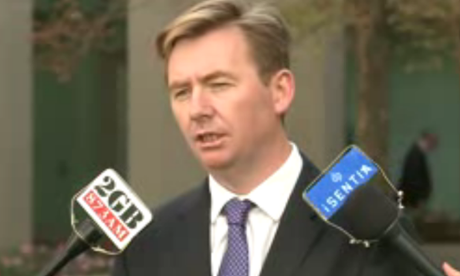President of the AMA says doctors will not accept any proposal which reduces the Medicare rebate

The Australian Medical Association (AMA) says the health minister’s willingness to exempt nursing home residents from the proposed $7 co-payment is not enough to win their support for the controversial measure.
Peter Dutton signalled this week that aged care residents would be exempt from the co-payment as part of a compromise in the wake of the May budget.
But Brian Owler, the president of the AMA, which is the peak body representing doctors, says doctors will not accept any proposal which reduces the Medicare rebate.
Under the proposed co-payment the Medicare rebate would be reduced by $5, leaving patients to make up the difference. Doctors fear they would financially penalised for bulk billing.
Owler has suggested that Indigenous people, children and people on welfare be exempt from the co-payment as well as giving doctors their own discretion to decide if a patient can afford to pay or not.
When asked if exempting people in aged-care homes from the co-payment was enough Owler replied: “God, no.”
“There are much greater changes needed,” he said.
“We’ve made it clear we can’t support any cut to the Medicare rebate, it takes money out of general practices. We’re happy to look at a model of a co-payment for people who can afford it, but we won’t stand by while cuts are made to general practices.”
Owler said Dutton had agreed to evaluate the policy after they met on Wednesday. Owler said he had observed a “significant shift” in the public statements of Dutton and the prime minister, Tony Abbott, on the co-payment and they seemed very willing to negotiate.
“More vulnerable and disadvantaged groups need to be exempt from the co-payment, children should be exempt for a start and people who generally would not be able to afford a visit to the GP, people on the Disability Support Payment, for instance,” he said.
“There’s also the issue of how to deal with Indigenous Australians and the co-payment. If we are serious about Closing the Gap we need to make sure we are acting to encourage Indigenous people to visit the GP. All these things need to be considered.”
Owler’s comments come a day after the chair of the Council of Australian Governments (Coag) reform council warned that the $7 co-payment would disproportionately affect Indigenous people. Owler referenced the report that the Coag reform council released on Thursday saying failings in preventive healthcare were leading to Aboriginal deaths.
“I’m not sure when the next meeting [with Dutton] will be, but we have a pretty good working relationship with the minister, we’ll be looking at the modelling [about the impacts of the co-payment] which we would have thought would have been done before the budget, and discussing that,” he said.
Dutton told 2GB radio on Thursday he was open to exempting aged care residents from the GP co-payment after discussions with Owler.
“I think there’s more that we can do to try to provide GP and nursing services into aged care, and they’re the discussions we’re having with the AMA president, Professor Owler,” he said.
